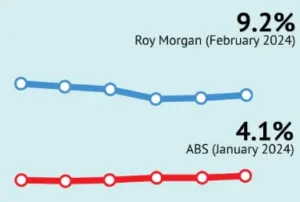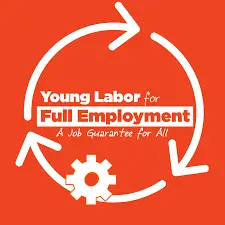
Description
Explore the paradox of unemployment and underemployment in Australia. Understand the political choices behind Youth Employment Australia.
Introduction: Understanding Australia’s Employment Paradox
Australia, a nation known for its economic strength and quality of life, faces a troubling paradox: high rates of unemployment and underemployment. This situation is puzzling, given Australia’s currency sovereignty, which theoretically allows the government to create jobs and ensure economic stability. This article explores the underlying political choices and their impact on Youth Employment Australia, aiming to uncover why these issues persist.
The Unsettling Reality of Joblessness in Australia
February 2024 Statistics: A Stark Overview
Roy Morgan’s February 2024 report highlights a concerning scenario: 9.2% of Australians are unemployed, and 9.6% are underemployed. These figures show a sizeable part of the population is either without work or unable to find sufficient employment, reflecting deep-rooted issues in the job market.
Unemployment and underemployment rates in Australia reveal that a considerable number of individuals struggle to find adequate work. This disparity highlights systemic issues within the job market, which cannot be solely attributed to economic fluctuations but rather to persistent structural problems.
Defining Unemployment and Underemployment
Unemployment: Individuals actively seeking work but unable to find any. This group includes people who are available for work and have taken steps to find employment within a specific period.
Unemployment signifies a waste of human resources and potential, affecting both individuals and the broader economy. Those who are unemployed face financial stress, loss of skills, and decreased mental well-being, leading to a cycle of poverty and reduced opportunities.
Underemployment: Individuals employed but not to their full capacity. This can mean working fewer hours than desired or being overqualified for their current role. This group includes part-time workers wanting more hours or full-time workers in positions that do not use their skills or education.
Underemployment is equally problematic, as it implies that the workforce is not being used efficiently. Those who are underemployed often struggle with job satisfaction, economic insecurity, and limited career progression, affecting their long-term prospects.
Understanding these terms helps grasp the complexity of the job market and the nuances of joblessness in Australia. It reveals that simple employment figures do not capture the full extent of labor market issues.
The Paradox of Currency Sovereignty: Australia’s Financial Power
Australia’s Dollar Sovereignty Explained
Australia, like any government with its own currency, is not financially constrained like households or businesses. It can theoretically create more money to fund public services, reduce taxes, or invest in job creation programs. This raises a critical question: why do unemployment and underemployment persist?
Currency sovereignty means that the Australian government has the unique ability to issue and control its currency, the Australian dollar. Unlike households and businesses that must balance their budgets, the government can create money to meet its obligations and stimulate economic activity.
Political Choices and Neoliberal Policies
Over the past few decades, neoliberal policies focusing on market liberalization, privatization, and deregulation have reshaped Australia’s economic landscape. Despite having the financial power to adopt different strategies, the government’s adherence to neoliberal principles has led to a job market dominated by temporary and part-time positions, leaving many Australians without stable, fulfilling employment.
Neoliberalism emphasizes reducing government intervention in the economy, promoting free markets, and encouraging private enterprise. However, these policies have often resulted in reduced job security, fewer public sector jobs, and a reliance on market-driven solutions that do not always align with public welfare.
The Impact on Youth Employment in Australia
Challenges Facing Young Australians
Australia’s youth face a job market vastly different from earlier generations. Elevated levels of casualization and short-term contracts make it difficult for young Australians to secure stable, long-term employment. This instability affects their financial security, career prospects, mental health, and overall well-being.
Young Australians entering the workforce meet an environment where full-time, permanent jobs are increasingly scarce. Instead, they find themselves in casual or gig economy roles that offer little job security, benefits, or career advancement opportunities. This precarious employment situation has significant implications for their future, including difficulties in achieving financial independence, saving for retirement, and planning for major life events like buying a home or starting a family.
Statistical Insight: Youth Employment Trends

Roy Morgan’s February 2024 report shows a higher unemployment rate among young Australians compared to other age groups, highlighting the challenges they face in securing meaningful employment.
The youth unemployment rate often serves as a barometer for broader economic health. High youth unemployment and underemployment rates suggest structural problems in the labor market that disproportionately affect younger generations, who are essential for future economic growth and innovation.
Reimagining Government Policies: Solutions and Pathways Forward
The Federal Job Guarantee: A Transformative Idea

Addressing the employment crisis requires a revolutionary approach. One promising solution is the implementation of a Federal Job Guarantee, administered locally, to ensure full employment and end the issues of unemployment and underemployment.
A Federal Job Guarantee would provide a public sector job to anyone willing and able to work but unable to find employment in the private sector. This program could create meaningful work in areas such as infrastructure, environmental conservation, education, healthcare, and community services, tailored to meet local needs and priorities.
Benefits of a Federal Job Guarantee
1. Job Creation: Offers public sector jobs to all Australians willing and able to work but unable to find employment in the private sector.
By guaranteeing employment, the government can directly address the job shortage, providing stable and meaningful work for those currently unemployed or underemployed.
2. Local Relevance: Customizes jobs to fit the specific needs of local communities, enhancing community well-being.
Local administration of the job guarantee program ensures that the jobs created are relevant and beneficial to the community, addressing specific needs and promoting regional development.
3. Economic Stability: Uses Australia’s monetary capabilities to foster economic stability and social justice.
Leveraging currency sovereignty allows the government to fund this program without the traditional fiscal constraints, promoting economic stability and reducing inequality.
4. Quality Improvement: Sets a benchmark for wages and working conditions, exerting upward pressure on the private sector.
By providing good wages and conditions in public sector jobs, the program can influence private sector employers to improve their employment standards, helping the broader workforce.
Conclusion: Paving the Way to a Prosperous Future
The concept of a Federal Job Guarantee presents a promising solution to the persistent challenges of unemployment and underemployment in Australia. By using currency sovereignty and prioritizing community needs, Australia can create a more inclusive and prosperous future. This bold approach not only addresses joblessness but also strengthens the nation’s economic and social fabric.
Adopting a Federal Job Guarantee could transform the labor market, providing stability and opportunity for all Australians. It would ensure that everyone willing and able to work has access to meaningful employment, thereby enhancing economic productivity and social cohesion.
Questions for Readers
How do you think the Australian government can effectively use its currency sovereignty to address unemployment and underemployment?
Call to Action
Voice your concerns and suggestions on this issue! Engage with local representatives, take part in discussions, and vote for policies that promise a more inclusive and stable job market. Your voice matters in shaping the future of employment in Australia.
Share this article with your contacts and on social media to raise awareness and foster discussion about Australia’s employment paradox.
References:
“February 2024 Australian ‘real’ unemployment by Roy Morgan.” This reference underpins the article’s discussion on the current unemployment and underemployment rates, providing a factual basis for the analysis.
https://www.ineteconomics.org/research/experts/ptcherneva
https://papers.ssrn.com/sol3/papers.cfm?abstract_id=3025544
https://www.booktopia.com.au/the-case-for-a-job-guarantee-pavlina-r-tcherneva/book/9781509542109.html
Is Australia in a recession? Yes and no – Spizeo. https://spizeo.com/blogs/news/is-australia-in-a-recession-yes-and-no
Underemployment – Due. https://due.com/terms/underemployment/
